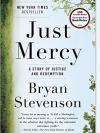
Read Across Rhode Island Book Discussion
“Just Mercy is every bit as moving as To Kill a Mockingbird, and in some ways more so. . . . [It] demonstrates, as powerfully as any book on criminal justice that I’ve ever read, the extent to which brutality, unfairness, and racial bias continue to infect criminal law in the United States. But at the same time that [Bryan] Stevenson tells an utterly damning story of deep-seated and widespread injustice, he also recounts instances of human compassion, understanding, mercy, and justice that offer hope. . . . Just Mercy is a remarkable amalgam, at once a searing indictment of American criminal justice and a stirring testament to the salvation that fighting for the vulnerable sometimes yields.”—David Cole, The New York Review of Books
“A searing, moving and infuriating memoir . . . Bryan Stevenson may, indeed, be America’s Mandela. For decades he has fought judges, prosecutors and police on behalf of those who are impoverished, black or both. . . . Injustice is easy not to notice when it affects people different from ourselves; that helps explain the obliviousness of our own generation to inequity today. We need to wake up. And that is why we need a Mandela in this country.”—Nicholas Kristof, The New York Times
“Unfairness in the justice system is a major theme of our age. . . . This book brings new life to the story by placing it in two affecting contexts: [Bryan] Stevenson’s life work and the deep strain of racial injustice in American life. . . . You don’t have to read too long to start cheering for this man. Against tremendous odds, Stevenson has worked to free scores of people from wrongful or excessive punishment, arguing five times before the Supreme Court. . . . The book extols not his nobility but that of the cause, and reads like a call to action for all that remains to be done. . . . The message of the book, hammered home by dramatic examples of one man’s refusal to sit quietly and countenance horror, is that evil can be overcome, a difference can be made. Just Mercy will make you upset and it will make you hopeful. . . . Stevenson has been angry about [the criminal justice system] for years, and we are all the better for it.”—Ted Conover, The New York Times Book Review